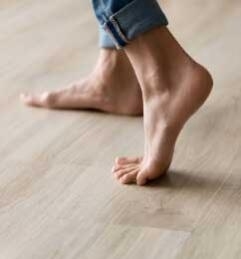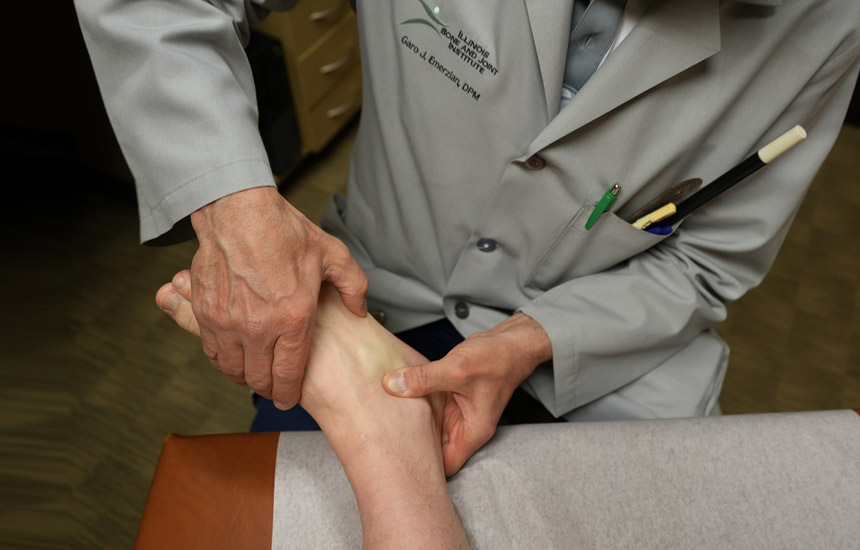Find a Doctor
If this is a medical emergency, dial 911 immediately or visit one of IBJI’s OrthoAccess Immediate Care locations.

While IBJI’s orthopedic surgeons (MDs) and podiatrists (DPMs) have extensive training in foot care, some conditions may be more appropriate for one type of provider over another.
Our patient support team can help you get scheduled to see the best specialist for your condition or injury.
Talk to an expert at the medical office or clinic where you’d like to be seen.
Conditions, Disorders, and Injuries
You don’t have to live with debilitating foot pain. IBJI’s specialists are trained to diagnose conditions and injuries of the foot, including sprains, bunions, stress fractures, and more. They will find out what’s causing your pain and work with you on the best foot care plan.
Causes of Foot Pain
- Adult-Acquired Flatfoot
- Collapsed Arch
- Posterior Tibial Tendon Dysfunction
- Arthritis
- Big Toe Joint
- Arthritis: Hindfoot
- Midfoot
- Bone Tumors
- Bunions
- Charcot Foot
- Corns
- Diabetes-Related Issues
- Foot Callus
- Foot Deformity
- Foot Fractures
- Acute Injury
- Jones Fractures
- Stress Fractures
- Foot Laceration
- Gout
- Claw Toe/Hammer Toe
- Infections
- Ingrown Toenail
- Morton’s Neuroma
- MTP Synovitis
- Plantar Fasciitis
- Plantar Wart
- Sesamoiditis
- Traumatic Injuries
Foot Treatments
IBJI’s experienced team includes specialists in advanced surgical and non-surgical treatments for foot conditions and injuries. They will work with you to develop a foot care plan that fits your lifestyle and provides the pain relief and mobility you’re looking for.
Non-Surgical
- Acupuncture
- Bracing
- Casting
- Custom Orthotics
- Durable Medical Equipment
- Casting/Bracing/Splints
- Custom Orthotics
- Footwear Recommendations
- Functional Rehabilitation
- Gait Retraining
- Imaging (MRIs and CT scans)
- Immediate Care (OrthoAccess)
- Injections (Cortisone)
- Medical Management
- Nutrition Counseling
- Occupational Therapy
- OrthoHealth Referrals
- Pain Management
- Physical Therapy
- Splints
Surgical
- Achilles Tendon
- Reconstruction
- Repair
- Amputation
- Bone Fusions
- Bunion Surgery
- Fracture Surgery
- Fusions/Arthrodesis
- Metatarsal Surgery
- Morton’s Neuroma Surgery
- Nerve Release Surgery
- Reconstructive Surgery
- Tendon Repair
- Surgical Drainage (Debridement)
FAQs about Foot Care
How do I know if my foot pain is serious?
If you’ve tried home remedies and rest for your foot pain and it doesn’t improve, you should see a specialist who can diagnose your condition.
What are some causes of foot pain at night?
Foot pain that feels worse at night could be caused by several foot injuries or conditions, including peripheral neuropathy or a pinched nerve. The best way to find out what is causing your pain is to get a proper diagnosis from an experienced podiatrist who can recommend an advanced foot care plan.
How does weight affect the health of your feet?
Every extra pound of weight you carry puts that much more pressure on the weight-bearing joints in your feet. Because of this, overweight and obese people are at higher risk for foot conditions and injuries, including:
- Plantar Fasciitis
- Tendinitis
- Bone Spurs
- Gout
What's the difference between a podiatrist and an orthopedic surgeon?
The main difference between a podiatrist and an orthopedic surgeon centers on their training and the scope of their practice, particularly concerning the treatment of the musculoskeletal system.
Podiatrists' training primarily focuses on conditions, diseases, and injuries affecting the foot and ankle. Following podiatry school, podiatrists complete a residency focused on podiatric medicine, which includes the diagnosis and treatment of foot, ankle, and related lower extremity conditions.
Orthopedic surgeons treat a broader range of conditions affecting the entire musculoskeletal system, which includes bones, joints, ligaments, tendons, muscles, and nerves. They attend medical school and then undertake a residency in orthopedics. They may treat injuries and conditions from head to toe and can specialize in specific areas like sports medicine, joint replacement, or spine surgery. Additionally, orthopedic surgeons are trained in both surgical and non-surgical treatments.
What are some non-surgical treatment options for foot problems?
Non-surgical treatments include physical therapy, orthotic devices, medications for pain and inflammation, corticosteroid injections, and lifestyle modifications such as changes in footwear and activity levels.
What should I expect during my first visit for a foot evaluation?
During your first visit, the specialist will review your medical history, conduct a physical examination of your foot, and may order imaging tests like X-rays. You'll discuss your symptoms and treatment options will be explored based on your specific condition.
How do orthotics work and who should consider them?
<p>Orthotics are custom-designed devices worn inside the shoe to support and align the foot, improve posture and walking patterns, and alleviate discomfort. Individuals with chronic foot pain, abnormal walking patterns, or structural foot abnormalities can benefit from orthotics.</p>
Related Resources
Check out this collection of videos for more information about some of the most common problems diagnosed and treated by IBJI’s ankle and foot care specialists.





